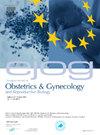Causal associations between dietary habits and age at natural menopause: A two-sample diet-wide Mendelian randomization study
IF 2.1
4区 医学
Q2 OBSTETRICS & GYNECOLOGY
European journal of obstetrics, gynecology, and reproductive biology
Pub Date : 2025-01-30
DOI:10.1016/j.ejogrb.2025.01.047
引用次数: 0
Abstract
Background
Menopause, the natural cessation of menstrual cycles, marks a significant phase in a woman’s life and is associated with various health outcomes. While previous observational studies have suggested associations between dietary habits and the age at natural menopause (ANM), their findings have been inconsistent and often confounded, making it difficult to infer causality. This study aims to assess the causal relationships between dietary habits and ANM using a two-sample diet-wide Mendelian randomization (MR) approach.
Methods
The study utilized data from 445,779 participants in the UK Biobank and genetic data from 201,323 women in the ReproGen Consortium. We selected single nucleotide polymorphisms associated with 38 dietary habits as instrumental variables for MR analysis. We applied MR methods, including inverse variance weighted (IVW), MR-Egger, weighted median, and weighted mode, to assess associations. Sensitivity analyses, including heterogeneity tests, pleiotropy assessments, and leave-one-out analyses, were conducted to validate the robustness of the findings.
Results
Beer or cider consumption and spread on bread consumption were linked to an earlier onset of menopause. Oily fish consumption showed a potential association with a later onset of menopause, though this was not significant after false discovery rate correction. Sensitivity analyses confirmed the robustness of these findings, indicating no significant pleiotropy and stable effect estimates.
Conclusion
This study provides evidence that certain dietary habits may influence the timing of menopause. These insights underscore the importance of diet in reproductive aging and warrant further investigation to better understand these relationships and their underlying mechanisms.
求助全文
约1分钟内获得全文
求助全文
来源期刊
CiteScore
4.60
自引率
3.80%
发文量
898
审稿时长
8.3 weeks
期刊介绍:
The European Journal of Obstetrics & Gynecology and Reproductive Biology is the leading general clinical journal covering the continent. It publishes peer reviewed original research articles, as well as a wide range of news, book reviews, biographical, historical and educational articles and a lively correspondence section. Fields covered include obstetrics, prenatal diagnosis, maternal-fetal medicine, perinatology, general gynecology, gynecologic oncology, uro-gynecology, reproductive medicine, infertility, reproductive endocrinology, sexual medicine and reproductive ethics. The European Journal of Obstetrics & Gynecology and Reproductive Biology provides a forum for scientific and clinical professional communication in obstetrics and gynecology throughout Europe and the world.

 求助内容:
求助内容: 应助结果提醒方式:
应助结果提醒方式:


